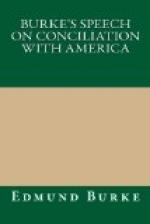Is this description too hot, or too cold; too strong, or too weak? Does it arrogate too much to the supreme legislature? Does it lean too much to the claims of the people? If it runs into any of these errors, the fault is not mine. It is the language of your own ancient Acts of Parliament.
“Non meus hic
sermo, sed quae praecepit Ofellus,
Rusticus, abnormis sapiens.”
[Footnote: 56]
It is the genuine produce of the ancient, rustic, manly, homebred sense of this country.—I did not dare to rub off a particle of the venerable rust that rather adorns and preserves, than destroys, the metal. It would be a profanation to touch with a tool the stones which construct the sacred altar of peace. I would not violate with modern polish the ingenuous and noble roughness of these truly Constitutional materials. Above all things, I was resolved not to be guilty of tampering, the odious vice of restless and unstable minds. I put my foot in the tracks of our forefathers, where I can neither wander nor stumble. Determining to fix articles of peace, I was resolved not to be wise beyond what was written; I was resolved to use nothing else than the form of sound words, to let others abound in their own sense, and carefully to abstain from all expressions of my own. What the law has said, I say. In all things else I am silent. I have no organ but for her words. This, if it be not ingenious, I am sure is safe. [Footnote: 57]
There are indeed words expressive of grievance in this second Resolution, which those who are resolved always to be in the right will deny to contain matter of fact, as applied to the present case, although Parliament thought them true with regard to the counties of Chester and Durham. They will deny that the Americans were ever “touched and grieved” with the taxes. If they consider nothing in taxes but their weight as pecuniary impositions, there might be some pretence for this denial; but men may be sorely touched and deeply grieved in their privileges, as well as in their purses. Men may lose little in property by the act which takes away all their freedom. When a man is robbed of a trifle on the highway, it is not the twopence lost that constitutes the capital outrage. This is not confined to privileges. Even ancient indulgences, withdrawn without offence on the part of those who enjoyed such favors, operate as grievances. But were the Americans then not touched and grieved by the taxes, in some measure, merely as taxes? If so, why were they almost all either wholly repealed, or exceedingly reduced? Were they not touched and grieved even by the regulating duties of the sixth of George the Second? Else, why were the duties first reduced to one third in 1764, and afterwards to a third of that third in the year 1766? Were they not touched and grieved by the Stamp Act? I shall say they were, until that tax is revived. Were they not touched and grieved by the duties of 1767, which were likewise repealed,




